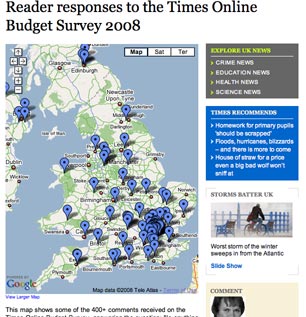The ‘fuss’ was started by an article from Donnacha Delong, a member of the NUJ‘s multimedia commission, published in the Journalist (we’re still waiting for our copy because of the postal strikes, but you can read the whole thing on Delong’s blog).
The article is an introduction to a report by the NUJ’s commission on multimedia working to be released in full next month and, according to the blogosphere, it makes some sweeping arguments that suggest the NUJ is anti-digital media.
Communities editor of Telegraph.co.uk Shane Richmond’s initial reaction to the article on his blog described it as ‘scaremongering’, ‘reactionary’ and ‘badly-argued’.
In a further blog post, Richmond takes to task the whole spread of articles on convergence in the Journalist in which Delong’s article features. He challenges several of the ideas it raises, including:
- that journalists need protection from new media
- that online publishers replicate their competitors producing “a dull uniformity of content and presentation”
- that the online medium restricts design and opportunities for user experience
Jeff Jarvis, whose first reaction to the NUJ’s article was that it was a “whiny, territorial, ass-covering, protecting-the-priesthood, preservation-instead-of-innovation faux” report, is now urging a different approach.
In an updated post on Buzzmachine Jarvis writes that “if you’re a union representing journalists today, you probably don’t know which way is up and who’s the enemy and what you’re fighting for. All the old reflexes and relationships are archaic.”
The idea that the NUJ’s structure as a union body needs to be adapted to better accommodate online journalism is echoed by Roy Greenslade, who has resigned from the NUJ in reaction to its approach to digital media.
As Greenslade says in his blog:
“[Shane] Richmond rightly points to the NUJ’s underlying assumption that the net is a threat to journalism when, of course, it is much more a threat to the union itself. Why? Because the union, as with the print unions of old, cannot possibly adapt to meet the revolutionary demands of a new technology.”
The debate is spreading – as a round-up by Shane Richmond shows even US site Valleywag has picked it up.
Final verdicts await given that the full report won’t be available until mid-November we are assured.
In the mean time take a look at Martin Stabe’s summary of the commission’s initial findings, which points out the following:
“The commission’s survey on NUJ chapels found that 50 per cent of chapels had experienced redundancies since the web operation was introduced; 75 per cent of chapels said their workloads had increased; 37 per cent said journalists were working longer hours. Only 34 per cent said the quality of new media was professional, 52 per cent called it adequate, and 14 per cent said it was poor.”
While the union’s structure and attitude to online journalism should and is being scrutinised throughout the blogosphere, if some of the experiences of journalists found by the commission and reported by Stabe are true then these are worrying developments that the industry must act upon. Unfortunately, these articles suggest that the NUJ may not be fit to do this.
